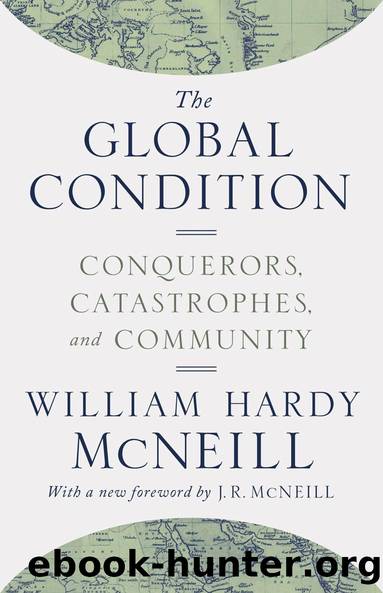The Global Condition: Conquerors, Catastrophes and Community by William H. McNeill

Author:William H. McNeill [McNeill, William H.]
Language: eng
Format: epub
Tags: History
ISBN: 9780691086484
Google: z4C8QgAACAAJ
Goodreads: 1680004
Publisher: Princeton University Press
Published: 1992-11-19T00:00:00+00:00
MICROPARASITISM, MACROPARASITISM, AND THE COMMERCIAL TRANSMUTATION
IN MY FIRST lecture I traced the development of humanity to its achievement of a potentially stable pattern of life under conditions of civilization. By about 1 A.D., commands issued from a sovereign center and applied locally by bureaucratic agents of a distant ruler acting in uneasy collaboration with local landlords, chieftains, and other men of power could regulate and (more or less) safeguard the sorts of mutual dependency that urban specialization had called into being among populations living hundreds of miles apart from one another. Such territorially extensive states as the Han, Roman, Parthian, Mauryan, and Kushan empires may therefore be considered as constituting an institutionally adequate response to the novelties inherent in the urban transmutation that began about 4000 B.C. in Mesopotamia.
It is noteworthy that similar state structures arose not just in the Old World but also in the New, beginning about 1000 years later. Amerindian social organization had indeed not passed beyond this level of organization at the time the Spaniards broke in upon the Aztec and Inca empires of Mexico and Peru, bringing them to an abrupt and catastrophic end. The apparent convergence of patterns of development in mutually isolated regions of the earth suggests that the evolution from priestly to military-bureaucratic management was not simply accidental. Instead it seems plausible to believe that the intensified human interdependence that had been induced by urban specialization needed a protective carapace. Bureaucratic command systems were the simplest way to meet that need, perpetuating into adulthood a childlike dependence on a superiorâs direction.
My second major point was that, beginning about 1 A.D., a new kind of transformation began to assert its power over human behavior in the Old Worldâa change I propose to call the âcommercial transmutation.â This refers to an enlarged commerce that began to link China with the Mediterranean and both with India soon after the Christian era. Long-distance trade of this kind responded mainly to market price differentials. Decisions and actions initiated by thousands of private persons affected the movement of caravans and shipsâand determined what they would carry.
Of course, such decisions were also affected by bureaucratic commands. Governments were always good customersâfor some goods they were the only customers. But insofar as trade moved across jurisdictional boundaries, the power of officials and rulers was checked by the unwillingness of merchants to buy or sell at prices that would not meet their costs and assure them a profit as well. Official acts that violated this principleâa compulsory purchase at less than market prices or outright confiscationâdried up trade very rapidly. The same applied to more local exchanges within a single state. Thus, insofar as rulers and their officials fixed prices at less than market levelsâa policy especially prevalent in the grain tradeâthey inhibited the development of the private sector of the economy and perpetuated the command principle whereby men acted not of their own free will but in obedience to orders coming from someone above them in the political-social hierarchy.
Civilized societies
Download
This site does not store any files on its server. We only index and link to content provided by other sites. Please contact the content providers to delete copyright contents if any and email us, we'll remove relevant links or contents immediately.
The World Almanac and Book of Facts 2021 by Sarah Janssen(863)
The emperor wears no clothes by Jack Herer(379)
The Way Home by Unknown(346)
The Crises of Civilization by Dipesh Chakrabarty(324)
History of India: A History In 50 Events by Hourly History(279)
Darius in the Shadow of Alexander by Pierre Briant(279)
Hidden Links by Zac Sangeeth & Sangeeth Varghese(267)
The History of Human Marriage by Edward Westermarck(257)
A Military History of the Cold War, 1962â1991 by Jonathan M. House(253)
Prehistoric Europe by Champion Timothy. Whittle Alasdair. Shennan Stephen. Gamble Clive(245)
Flood Legends: Global Clues of a Common Event by Charles Martin(235)
History of the Jews: An Enthralling Guide from Ancient Times to the Present (Religion in Past Times) by Wellman Billy(228)
Chinese History: 500 Interesting Facts About China (Curious Histories Collection) by Ahoy Publications(213)
Big Tent by Mallory Factor(208)
The Education of Historians for Twenty-First Century by Thomas Bender; Philip F. Katz; Colin A. Palmer(205)
Mark Of The Scots - Cl by Duncan A. Bruce(199)
The Philosophy of Historiography by John Lange(197)
Ancient Roman Sports, A-Z : Athletes, Venues, Events and Terms by David Matz(192)
Other Pasts, Different Presents, Alternative Futures by Jeremy Black(191)
